|
I believe that I shall see the good things of the Lord in the land of the living. -Ps 27:13
The three of us sat around the dining table and cried—a toddler, a little boy, and a pregnant mom. A pitiful orchestra unleashed after a season of transition, a day of disobedience, and the moment that broke the camel’s back: a bowl of yogurt. The toddler had insisted on finishing the yogurt with his hands—which he was told would result in that being his final serving. He looked me in the eye and dipped his little hand in the bowl once more, using it as a makeshift spoon. The yogurt was taken. The wailing ensued. After what felt like 1,000 moments of defiance that day, after consecutive days of a 6-months-pregnant woman chasing small boys in the summer heat with little rest, and after racking my brains out to creatively navigate sibling rivalry, whining, and toddler grumpiness, I put my head on the table and started crying too. My 5-year-old joined in for moral support. After a few minutes of this little concert, I couldn’t help but laugh at the pitiful scene. What must it have looked like to the outside world? Two children and a grown woman competing for the loudest sobs. My husband came in a few minutes later from working in the yard and took over. “Go and rest,” he said. “I’ll take care of the boys.” I shuffled up the stairs, sniffling in defeat, for a few minutes to reset. And I knew I needed to see Him. I knew once again I needed to spend time with my Creator and regroup. Meditating on today’s Psalm from the daily readings reminds us of a beautiful truth: “I believe that I shall see the good things of the Lord in the land of the living.” Whether or not I felt it in this moment of exhaustion and despair, God’s goodness is always there. He stands ready to bestow on us His strength, His mercy, and His love in the here and now—even in the midst of suffering. The Lord never promised the removal of suffering from our lives (which any of us can note by listening to 30 seconds of the news cycle), but He did promise to sustain us and be with us “even to the end of time.” And it is for this reason that I can join the psalmist in choosing to see “the good things of the Lord” right here and now “in the land of the living.” This Psalm is particularly close to my heart because it has been turned into a lovely song by the ecumenical Taize community in the Burgundy region of France. The music of the Taize community was instrumental (no pun intended) in my reversion at the end of my college career and became an easy way for me to “pray without ceasing.” I have come to sing the song inspired by Psalm 27 for nearly a decade: “I am sure I shall see the goodness of the Lord in the land of the living,” the chant goes. “Yes, I shall see the goodness of the Lord. Hold firm, trust in the Lord.” There have been many days in this last trimester of pregnancy when I have had to cling to this belief and hold firm in trusting the Lord. My third pregnancy has brought with it the usual physical demands on the body, as well as the benefit of chasing two toddler boys around in the summer heat. Perhaps I can blame the extra dose of female hormones from my baby girl for the extra emotional complexity I’m experiencing. In my weekly women’s group in which we are reading “This Present Paradise: Spiritual Reflections from Elizabeth of the Trinity,” one of the questions for reflection was “do you ever feel small and insignificant?” I couldn’t help but laugh. “All the time!” I answered, especially now in a season in which I am grappling with my physical and emotional limitations. The independent woman who has always done things on her own, found a creative solution, and seen life in the glass half full perspective can barely walk to the playground, cook a meal, or lift a laundry basket. My easygoing nature has given way to my temper more times than I can count, and my patience is wearing thin. I’ve realized I can’t do anything during this time but cling to God. I am small. I am insignificant. But I am His. The Lord knit me in my mother’s womb, called me by name, and looked at me and proclaimed: “She is good.” The Lord worked throughout time and space to bring me into the fullness of redemption and sent His only begotten Son to die for me. And He continues to pour out His grace, mercy, and blessings on me through His Church, the sacraments, and my loving friends, family, and community. So yes, I am one of billions. I can only do so much. And though I may feel small and insignificant and overwhelmed these days, I can still see and experience the goodness of the Lord right here and now—in the land of the living. Hold firm. Trust in the Lord. For more resources on Marriage and Family, please click here.
0 Comments
8/24/2021 It Will All Fall Into Place: Reflections on Graduating During the COVID-19 PandemicRead Now2020 was a difficult year for so many people; it is safe to say that we all were impacted in some way. To me it felt like the entire world stopped and everything started moving in slow motion. March 2020 was my senior year of college—what was supposed to be the best semester of my life, the beginning to the end, the start of a new chapter. Yet, there I was, driving back to my family home in Massachusetts to study and then graduate in the home that I grew up in. I felt so crushed, defeated, and overwhelmed. I remember that Easter, only a few weeks into the pandemic, feeling so overjoyed that some of my friends and parish community decided to come together and celebrate our Risen Lord. We had a drive-by celebration in the parking lot where our pastor blessed each of us and we waved at our friends from the safety of our car. I felt so overjoyed to see their faces and to get a glimpse of normalcy. I remember that Easter morning being filled with joy, possibly the Lord’s way of showing us that there is a light at the end of the tunnel. Yet, around that same time, we found out that school was cancelled for the rest of the semester and Zoom became our new normal. I remember thinking, “The last time I stepped into a classroom was the day before spring break and all I wanted to do was get out of there, but now, I’ll never be able to go back.” While that may have been a bit dramatic, it truly was a time where my faith was the only thing that was able to guide me. While I was upset over the loss of my senior year and the loss of long-anticipated memories, I was so thankful and blessed to have my health, my family, and my faith. There were so many people grieving the loss of family members, enduring financial difficulties, and risking their lives on the frontlines of the pandemic. It was hard not to laugh at myself for crying over my difficulties when faced with the reality of what was going on throughout the world. The Lord guides us on a path. Though we may not know where or how it ends, we know He is there. I knew this time in my life would already be difficult—saying goodbye to friends, trying to find a “real” job, and trying to balance new responsibilities. Adding to that the uncertainty of a pandemic only exacerbated the overwhelming anxiety I knew was around the corner. I kept repeating this phrase over and over in my head: “it is all part of God’s plan.” The phrase kept rekindling faith in my heart when things began to feel difficult. It can be seen as a silly, trite phrase. But for me, the impact it had on my life was so important. It helped me to have a conversation with the Lord daily—whenever things felt tough or I felt defeated or just lost. After repeating the simple phrase over and over in my head, I felt the Lord’s presence like a hand on my shoulder continuing to guide me throughout life. I couldn’t help but exhale. Graduation came and went. I wore my cap and gown in my childhood living room surrounded by my parents trying to figure out how to set up Zoom on the T.V. It was an underwhelming experience compared to the grand festivities I had imagined, yet I was very thankful to be able to celebrate with my parents. Trying to navigate through “adult life” during the pandemic proved to be difficult within itself. It felt so easy to isolate myself from those around me and to disconnect from everything. Everything seemed big: applying for jobs, getting my first apartment, living in the city. It often felt easier to give up when things got difficult. But that is exactly the opposite of what the Lord calls us to do. The Lord wants us to call upon him during the difficult times and to remember that everything is part of his plan. He is there to walk with us through the ups and downs and invites us to lean upon his strength in times when ours fails. While the road ahead seems uncertain, there is one thing that we can count on - the love and support of the Lord. Over the past year, what I have found is that everything is part of His plan; every small step we take, every thought that enters our mind, every mundane task—it all will fall into place.
“He placed himself, in the words of Saint John Chrysostom, “at the service of the entire plan of salvation”. With praise as high as this, Pope Francis described Saint Joseph and his unique place between the Mother of God and the Son.
If Saint Joseph occupies a pivotal role in the divine plan, then his role in my family is just as special. Both of my godsons have the middle name of Joseph - as do I, and my father, his brother, and their father before them. In our family, Joseph is first and foremost a protector. In the Apostolic Letter declaring the Year of Saint Joseph, the Holy Father describes St. Joseph in this way: “Joseph was the earthly shadow of the heavenly Father: he watched over him and protected him, never leaving him to go his own way.” A fundamental element of being a godfather, born from the promises made at Baptism, is the obligation to watch over my godchildren. The daily exercise of this responsibility occurs through prayer. Since the start of the pandemic eighteen months ago, it’s been next to impossible to see my godchildren in person or to be a physical presence in their lives. Consequently, my responsibility to keep them in daily prayer has become doubly important. Morning prayer for my three godchildren is a cornerstone of my daily routine. That prayer has been a constant for me, even when other elements of my routine undergo the dry spells that are part and parcel of the spiritual life. This steadfast but gentle responsibility - prayer for my godchildren - has been a source of sanctification for me. In this, I am privileged to follow in the footsteps of Saint Joseph, who had the unique grace to help raise the Son of God and to be shaped and formed by this responsibility. Beyond protection, Saint Joseph is a model for godfathers by dint of his vigilance. While not strictly a virtue, this watchfulness is closely related to the virtues of prudence, fortitude, and temperance. The Gospel of Luke puts it thus: “Be dressed for action and have your lamps lit” (Lk 12:35). Matthew relates the command of God in even more explicit terms: “Get up, take the child and his mother” (Mt 2:13). While taking nothing away from the Blessed Mother’s incomparable “Fiat”, Joseph exemplifies the ability of responsiveness to God’s call in the face of uncertainty. For me as a godfather, this means living in such a way that I can be responsive to my own godchildren. That might mean being prepared to travel long distances in order to make a sacramental celebration or a birthday. As my godchildren mature and explore their faith, it may also mean being an additional source of counsel (or a source of comfort to stressed-out parents!). Whatever the call may be, the response is the same: be prepared to answer without hesitation, as Saint Joseph did. I would be remiss by not mentioning that Joseph’s care for the Blessed Mother is an example of paramount importance for any godfather seeking to advance his own spiritual life and that of his godchildren! One final element of contemplation for me as a godfather is the title of Saint Joseph the Worker, particularly as it relates to the life of Christ. Through his steady and diligent work, Saint Joseph was a model and example for Our Lord, who himself spent the first thirty years of his life laboring as a carpenter and preparing for his ministry. In the words of Pope Leo XIII, writing in the encyclical Rerum Novarum: “This is enforced by what we see in Christ Himself, who, ‘whereas He was rich, for our sakes became poor’; (18) and who, being the Son of God, and God Himself, chose to seem and to be considered the son of a carpenter - nay, did not disdain to spend a great part of His life as a carpenter Himself. ‘Is not this the carpenter, the son of Mary?’(19)” To this, let me add the words of the Holy Father in his apostolic letter, Patris Corde: “Joseph is certainly not passively resigned, but courageously and firmly proactive. In our own lives, acceptance and welcome can be an expression of the Holy Spirit’s gift of fortitude.” Saint Joseph is an exemplar not only of the ability to respond immediately to God’s call when it comes, but also of the fortitude and diligence to work patiently and well until that call comes. Through his example, we godfathers are reminded to “trust in the slow work of God”, confident that in prayer, labor, and - above all - openness to God’s voice, we can strive to be as Saint Joseph was: “at the service of the entire plan of salvation.” During my formative years, I had the distinct privilege of spending time with my grandads and even one great-grandad. In the late 1950’s and ‘60’s, our pace of life and activities was very different from today. We attended school and church, but a lot of our time was centered around our home. Even more unique were our regular visits with extended family on a weekly basis. This afforded me time to be in the company of my grandparents frequently. I listened to their talk about work and how they solved problems and the things that occupied their time. I enjoyed accompanying my dad’s dad on outings to pick blackberries and then had the pleasure of helping in the process to make wine in his cellar. My Grandpop was a nuts-and-bolts kind of man, always busy with his work as caretaker of the cemetery, keeping their only vehicle (an old Ford truck) running, and maintaining the house where he and my grandmom raised thirteen children. It was fascinating learning things from him. I would follow him around and help load coal into their furnace and collect items from the cool cellar that housed their canned vegetables and held Grandpop’s workbench. He liked to show any of us grandkids the things he did for work, as well as the projects he worked on, such as building cedar benches for anyone who wanted one and making wine from the fruits he picked. They lived a hop, skip and a jump from the monastery church and school where they walked to 6am daily Mass. By society’s standards, Pop was minimally educated and made a meager wage that kept them in the lower economic level their entire lives. The gifts we received were hand-made and simple, but lots of time was invested in being family together. I loved being in Grandpop’s shadow and considered the cemetery near their house to be the most magical place in my world with its little streams and bridges and huge fir trees and rolling hills. Amongst those resting in peace, my dad and his twelve siblings grew up under the tutelage of my grandpop’s calloused hands and the soft-spoken voice of my grandmom. My grandmom’s parents lived just three blocks away, and my great-granddad was a successful stone mason with a shop full of heavy, rough-hewn tools that carved important information into big pieces of granite for the deceased. As an adult, I realize how fortunate I was to have enjoyed weekly visits to my great-grandparents. Great-granddad was a tall, polite, and loving man. He would sit me atop a piece of stone and include me in the conversations with my dad and other family. He had two framed pictures over the desk in his shop – the Sacred Heart of Jesus and the Immaculate Heart of Mary. As a kid, I always felt that they were watching me. These images hanging in a prominent place in his shop spoke volumes about the faith my great-granddad had. No matter how busy he was, he had a way of making me feel cherished when we came by. And a visit never ended until he sent us up to the house to get a drink and a slice of cake from great-grandmom. My mom’s dad was another wonderful grandfather with whom I spent much time while growing up. (I never met my grandmom because she died suddenly only three months after my parents were married.) Pop was a tall, handsome man who always wore a suit, and I mean always! He was retired from the phone company and had raised five children through the Depression era. His parents and aunt lived with them in a small but comfortable row home. Most of my time spent with Pop was at our house where he would come most days in the afternoons and stay through dinner. Sometimes we would pick him up at his apartment and I loved seeing his stuff. He was an avid follower of the Baltimore City Fire Department and had a squawk box to hear all the fire calls. He had boxes with index cards full of information on the different fire houses, calls, and each fireman. When my mom was growing up, he would pile the kids in his car and they would go watch the firemen fight fires. He supported the firemen with visits and gifts and had a deep respect for what they did for the community. I loved sitting at his feet in our living room listening to him tell stories of growing up in Baltimore and of his family. He was a regular member at our dinner table in his later years and always took an interest in my studies and in the things I was doing. When my parents would go away on their annual business trip, Pop would come take charge of our household. He made flapjacks for breakfast, walked me to the school bus stop and would meet me there each afternoon. I didn’t need an escort, but it was his way of sending me off. He played cards with us and told stories and made the best stew I’ve ever eaten! He made sure to remind me to say my prayers and he took us to church. Pop was present for all the holidays throughout the years, along with a lot of aunts, uncles, and cousins. Our house was the typical gathering place for my mom’s siblings and so I guess that’s why Pop always came over. In his later years when he could no longer drive, my parents wanted him to move in with us, but he insisted on his own independence and lived out his days, until he died at 89, in his apartment. As a kid, I never thought twice about Pop always being at our home. As an adult, I look back and see the treasure I had in being loved by a man who had all the time in the world to talk. It impacted me more than I realized. Mom and dad took care of the needs of the family, but Pop took the time to share himself with me and take an interest in what I was thinking as a young girl trying to figure out what was important in life. A generation removed, Pop made it abundantly clear how important each member of the family was to him, which instilled in me a strong desire for continued close family bonds in my adult life. I then watched how my dad became granddad to my six children. He was busy seven days a week and lots of nights running his business and providing for our family when I was a child, but as a granddad, he learned how to switch gears and devote attention to his grandchildren through time spent together. He took his role as grand patriarch seriously and lived out sharing the gospel of Jesus with all his grands in very simple but tangible ways. He was a great encourager of all the pursuits of each one and never hesitated to share his testimony of how God helped him on a daily basis to do what he was supposed to do. He shared prayers and taught them the power of talking with God all day long. And when my parents visited for two to three weeks each Christmas season, everyone could see how he laid out his days. He would be seen in a quiet chair early in the mornings with his well-worn prayer book praying his prayers. Then he and mom would attend morning Mass with any of us who would accompany them. He joined in our family prayer time and nightly Rosary. I have also enjoyed witnessing my husband embrace the role of Pops to our sweet grandchildren. He rejoices in the gift of each one and prays daily for them to always hear and respond to God’s call on their lives. He loves playing with them and particularly sharing his love of music with them. The treasure of knowing my granddads and being so loved by them has been a gift in my life that I know has helped me understand the love God our Father has for me. The beauty of the continuous bond from great-grandfather to grandfather to father is powerful and assures me of my heritage. The greatest lesson I learned from these loving men was to invest yourself in others and especially to build up and encourage each member. It doesn’t seem mighty or grand, but it strengthens the foundation of our lives and nurtures deep, holy growth in our specific God-ordained purpose. The richness of a grandfather’s love and care is a gift in the family. Their patriarchal leadership and security are God’s design for how families are enjoined together through the generations and meant to relate. I have had the privilege of this delightful heritage and my prayer is that it will continue to be nourished by the fathers to come in our family. For more resources on Marriage and Family, please click here. To learn more about the Year of St. Joseph, please click here.
As I write this, my laptop is balanced precariously on my knees because there is no longer space on my lap. My baby girl presses into my belly button with each hiccup, and I can’t help but think about her arrival. In the next three weeks, I will feel her hiccups against me from the outside. I will know her hair color and her features and I will breathe in her perfect newborn scent. Until then, I cherish the last days of my two-year-old being the baby, of my family being one of six instead of seven, and the time I have to prepare for her to enter the world.
First time mothers and mothers of many can easily relay their baby preparedness to-do lists: rinse the onesies, install the carseat, visit the doctor again. Physically and mentally, we work to be ready to welcome the sweet new life we created. I’m embarrassed to admit that I did not make plans around my spiritual readiness for a newborn until the birth of my fourth child. In all of my business preparing my mind and body for labor and delivery, God’s role in this life-event has been a mere afterthought. Confessing this to other mothers and mothers-to-be has revealed that I am not alone in this oversight. Being consumed by the physicality of what is happening to our bodies can edge out any focus on what is happening to our spirit. This time, I’m changing that. Through Seeking-Truth In Jesus Calling: Enjoying Peace in His Presence, Sarah Young writes, “When you seek My face, put aside thoughts of everything else. I am above all, and in all; your communion with Me transcends both time and circumstances. Be prepared to be blessed bountifully by My Presence, for I am a God of unlimited abundance.” The process of labor, delivery, and early mothering is one of humility. I deeply desire a window into the future so I can know and prepare for the date and time this baby will come, how delivery will go, and what the outcome will be. Of course, these are things I cannot know. By seeking Truth in His face, in the Word, and in the sacraments, I am invited to rest in the peace of what I do know: my baby and I are seen and known by the God of abundance. He alone knows what is to come, and His plan for me is good. Through Worship This truth leaves me in awe of our God, and I cannot help but to praise Him. My favorite form of worship is music, and I want to bring that into the delivery room. With each contraction, I can lose myself to the words celebrating His presence in the pain. It reminds me of His strength when I feel that I have come to the end of my own. Words of praise will be some of the first my baby hears. My labor playlist is available for you here. Through Prayer One of the many gifts of prayer is its communal nature. This has been a beautiful way to invite those we love into the process of preparing for the birth of our baby, and even into the delivery room. This pregnancy, we have invited our loved ones to pray a novena leading up to the baby’s due date. Our child’s godparents alongside many of the friends who witnessed our wedding, and vowed to help uphold us in our vocation to family life, will join us in the novena to Saint Mary Magdalene, praying for the safe delivery of our baby. (It starts today-- join us!) Other favorite prayers leading up to labor and delivery include: -St. Gerard Majella Novena for Expectant Mothers -Novena to Mary, Mother of God -Prayer for the Birth of a Child We invite our friends to pray for us, but we also invite them to offer their intentions so that we might pray for them. As Catholics, many of us are familiar with the phrase "offer it up." This means that we can enter into the redemptive suffering of Christ when we "offer up" our own suffering, work, or joy. The Catechism says, “The cross is the unique sacrifice of Christ, the ‘one mediator between God and men’ [1 Timothy 2:5]. But because in his incarnate divine person he has in some way united himself to every man, ‘the possibility of being made partners, in a way known to God, in the paschal mystery’ is offered to all men (618).” It is my hope to offer up the pain of childbirth for the cares and concerns of the people we love the most so we ask: How can I "offer up" the end of this pregnancy and my labor for you? Preparing my heart to walk alongside Jesus through the last days of pregnancy, childbirth, and recovery is the most important preparation I can make. Together with my Heavenly Father, the onesies will be cleaned and the hospital bag packed. In His presence, this child will come into the world with praise. My life and hers, our being, our all, are in Him and with Him, and for Him. And so, Amen. For more resources on Marriage and Family, please click here.
7/13/2021 Creating Memories: A Grandfather Reflects on His Role During the Year of St. JosephRead NowWe come in all colors, shapes, sizes. We come with many different names: Papa, Gramps, Granddaddy, Baba, Nonno or maybe even Skipper. The one thing we all share is our unconditional love for our grandchildren. One of my earliest memories of my grandfather Tony (Gramps) was sitting on his lap as he prayed the rosary. As l tried to pull it from his hands, he clutched his beads even tighter. I guess that was my first memory of prayer. When my wife and I had our first child, Gramps told me the 3 greatest things a grandfather can give his grandchildren are love, spoiling them rotten, and memories. I cherish the memories of Gramps to this day: sleeping over at my grandparents’ house, having my picture taken with him at my First Holy Communion, cutting his grass and him giving me a quarter, him asking me to sit next to him at his and grandma’s 40th anniversary dinner, and even taking my then-fiancée when I went to shovel his snow. These are some of the memories he created for me. My dad and father-in-law enhanced the grandfather experience for me as I watched them with our children and their cousins. Birthday parties, school plays, receiving the sacraments or graduations, grandpas were always there. At his grandkids’ Confirmations, my father-in-law would say “Another soldier for Christ”–adding more memories to my collection. l wonder what memories Jesus had of His grandfathers Joachim (the Patron Saint of Grandfathers) and Jacob, St. Joseph’s father. Did He pull on their prayer beads, sleep over at their houses, sit next to them at special occasions? As it becomes my turn to make memories, I pray to St. Joseph that my 4 precious grandchildren will have memories: a picture of us at their First Holy Communion, attending Mass together, me walking them to school or picking them up after school (well maybe after the pandemic), me telling them a corny Papa joke, them giving me a running hug, me spoiling them rotten or maybe even them tugging on my rosary. The aforementioned men have set the bar very high; it is my goal to follow in their footsteps. I remain extremely grateful every day that l have been entrusted to be the Papa of Mabel, Anna, Teddy and Lucy. In the year that Pope Francis has declared the Year of St. Joseph, my best hope would be that St. Joseph gives me the strength to teach them the ways of the Gospel and lead them down the path towards Christ. To me St. Joseph was like an unsung hero. His devotion must have been unwavering. Asked to be the earthly father to Jesus and husband of Mary, WOW!! what a responsibility. Teaching Jesus his trade as a carpenter, teaching Him to pray, preparing Him for manhood, things that many may overlook. St. Joseph simply did the things asked of him by God. God’s love shows through in picking Joseph for this oh so important role in Jesus’ life and the life of the Church. The more I read about St Joseph, the second J of the JMJ (Jesus, Mary and Joseph) I wrote at the top of my school papers long ago, the more awesome I think he is. He did so much without questioning his role. Thank you, St Joseph, for being an inspiration and guiding light as I navigate the waters of being a grandfather. St Joseph, pray for us (especially us grandfathers). To learn more about the Year of St. Joseph and our Fatherhood Series, please click here.
Over the last several years of my life, I have read, studied, and written hundreds of pages about what Pope Francis meant when he said in Evangelii Gaudium that “The Church will have to initiate everyone – priests, religious and laity – into this ‘art of accompaniment’ which teaches us to remove our sandals before the sacred ground of the other” (169). However, nothing has ever taught me more about accompaniment than one of the most special people I have ever known in my life: my grandmother.
My grandmother, Edith Lauritzen, was born a second-generation Irish Catholic in 1928 in Queens, New York. She was soft-spoken but had a hearty laugh that made an appearance in most conversations. Her favorite food was Chicken Parmesan, and she taught me the first prayers I ever learned. Sometimes, my grandmother would pick my sister and me up after school and treat us to ice cream. She would ask us about our day at school, and listen generously, as if the happenings of my sister’s and my days at elementary school were the most riveting and important things she could devote her time to. I spent a good bit of my early childhood with my grandmother, and when my grandfather passed away, she moved in with my family to a small bedroom on the first floor of our home. In our house, my grandmother was a steady presence in my life; her warmth, laughter, and joy were always a comfort. I enjoyed spending time with her and would sometimes wake up early in the morning if I heard her making her breakfast of toast and coffee in the kitchen just so that I could spend time with her. As I grew up, our shared Catholic faith became a topic of frequent conversation. In middle and high school, I remember spending hours talking with her in her bedroom. My grandmother’s room was small, with space only for her bed, dresser, and an armchair. The feeling of my foot falling asleep sticks with me as I reflect on talking with her, as sometimes our conversations lasted hours as I sat cross-legged on her wooden floor. Beyond some vague memories of the topics of prayer, the lives of the saints, and my hopes to visit St. Peter’s basilica one day, I do not remember anything specific about the topics of conversation. Rather, what rises to the surface in my memory of those conversations with my grandmother is her listening, her interest in my thoughts, and her joyful, warm presence that created the space for me to speak up and share my insights with a woman with 65 more years of life experience. Now, I look back and know that I might have spoken with a little too much certainty about God and the things of faith, and probably mused a little too grandiosely about my reflections on what certain Gospel readings meant. However, that didn’t matter to my grandmother. This was the gift that my grandmother gave to me: taking my faith, questions, and thoughts seriously. My grandmother could have seen my early, inexperienced love of my faith as childish or naïve. Instead, I think she saw my faith as wisdom, blooming and in process, attempting to make sense of God and life. In front of my grandmother’s armchair and unbeknownst to us both, my vocation as a theologian and woman of faith was being nurtured and cultivated. After my first year at college, my family had to move my grandmother to an assisted living home as she needed more care than we could provide at my house. I was devastated. My home felt like it lost a little bit of warmth. However, that first summer after my freshman year of college, I made it part of my daily routine to visit my grandmother. I spent afternoons with her, listening to her thoughts and reflections on her life, her stories about growing up with the other children in her neighborhood in Queens, and her relationship with my grandfather. We laughed as she told stories about living in New York, what it was like to go to Mass in Latin, and why she loved St. Thérèse (her favorite saint). Before moving to the assisted living home, my grandmother had never lived away from home, so sometimes, she would cry. I learned in those moments that what was important was not me offering some nugget of wisdom from our faith that would help her to reframe her thinking, but for me to be there, hold her hand, and be present. In the days after those afternoons where there were more tears than laughter in her voice, I would make sure to bring her a cup of chocolate ice cream to lift her spirits. It did not take long for me to realize it was now my turn to accompany my grandmother, just as she had accompanied me in my childhood and teenage years. Two summers later, my grandmother passed away. It was one of the most painful days of my life. At the same time, I was overjoyed at the thought of my grandmother getting to experience something so much better than our hours of conversation together about our faith: God himself. At my grandmother’s funeral Mass, one of the hymns my family selected was “O God Beyond All Praising.” While the entire hymn is a perfect way to describe the gift that my grandmother was to everyone she encountered, the words of the second verse have always particularly stuck out to me when I think about her: “The flower of earthly splendor in time must surely die, its fragile bloom surrender to you the Lord most high; but hidden from all nature the eternal seed is sown - though small in mortal stature, to heaven's garden grown” In reflecting upon my relationship with my grandmother, I think about how her accompaniment of me planted seeds in my life that continue to bloom and grow. Though she was older and weaker, my grandmother passed on to me the gift of faith, a gift that is an eternal reality that we share, and that I hope will bring us together in the next life. Even when my faith was more composed of immature certainty and over-zealous explanations of Scripture, my grandmother saw more than that. And, when it was my turn to accompany my grandmother in the last years of her life, she gave me the gift of continuing to grow these seeds of faith through my own cultivation of patient listening and presence. For me, my grandmother is a model of accompaniment, and was a witness to what Pope Francis writes in Evangelii Gaudium of the listening and patience required in accompaniment: “Only through such respectful and compassionate listening can we enter on the paths of true growth and awaken a yearning for the Christian ideal: the desire to respond fully to God’s love and to bring to fruition what he has sown in our lives (171).” Through my grandmother’s love, I learned to listen to God and respond to His love. I know the seeds of my faith are continuing to grow and bloom even after my grandmother’s death as she accompanies me with her prayers. For more resources on accompaniment, please click here.
Over the past year as I helped develop the Catholic Feast Days website, I was always struck by the number of saints whose feast days were in July. As we enter into this July, I found myself reflecting on the lives of the saints whose feasts are celebrated this month. From apostles to saints in our era and everywhere in between, the lives of the saints celebrated this month have offered great spiritual nourishment to me. Three well-known Saints: This month we get to celebrate three powerhouse saints: St. Benedict, St. Bonaventure, and St. Ignatius of Loyola. Sometimes I find it hard to relate to some of these well-known saints. St. Benedict helped found modern monasticism. St. Bonaventure was one of the greatest theologians of his time. St. Ignatius of Loyola founded the Jesuits. Together they set a pretty high, almost discouraging, standard that feels hard for me to reach. But, as I continue to learn more about their lives, I realize that throughout their ups and downs, they offered themselves to God, no matter how high the mountain or low the valley. Likewise, God is calling us to follow Him. He is calling each of us individually, wherever we are in our lives, to do the same. Four Saints on the Way: Starting later this week, we get to celebrate four ‘Blesseds’ in the Church: Bl. Pier Giorgio Frassati, Bl. Maria Romero Meneses, Bl. Stanley Rother, and Bl. Solanus Casey. Even among these four Blesseds, I can see the beauty in how God calls each of us personally. Whereas Bl. Pier Giorgio Frassait was a young Italian known for his social activism, Bl. Maria Romero Meneses was a Nicaraguan sister who devoted her life to teaching and helping all throughout Central America. Whereas Bl. Solanus Casey was a humble American Capuchin known for his spiritual counseling, Bl. Stanley Rother was an American pastor who volunteered for mission work in Guatemala for 15 years until he was martyred in 1981. Through the witnesses of their lives, these four Blesseds inspire me to live my life striving for holiness in whatever way God is calling me. Families of the Saints: Throughout this entire month, we are reminded of the importance of family in the lives of so many saints. Sts. Louis and Zellie Martin are the parents of two saints, including the well-known St. Therese of Lisieux. St. James the Apostle is the brother of St. John the Evangelist, also one of the Apostles. Sts. Joachim and Anne are the parents of Mary, the grandparents of Jesus, and the patron saints of grandparents. St. Bridget of Sweden is the mother of St. Catherine of Sweden. All of these saints helped me reflect on the importance of our families in our journey of faith. For many of us, let us follow the model of these saints and take advantage of the easing pandemic restrictions to get to see family members we may not have seen in well over a year. Not as well-known Saint for the Month: One saint in July who I wasn't very familiar with was St. Camillus de Lellis. I eventually learned that he was one of the patrons of the sick. The religious order he founded, the Camillians, is known as the Ministers to the Sick. What I find particularly inspiring about his life was that St. Camillus himself was sick most of his life and was in a state of constant suffering, yet he still devoted himself to this ministry. There are stories of him being unable to walk. Instead, he would crawl to visit the sick. Even as there is a light of hope to the eventual ending of the pandemic, let us continue to hold in prayer those who are sick with any ailment and those who care for them, and let us as the People of God pray for the intercession of St. Camillus. As we go throughout this July, let us walk with the saints as role models for offering to God all of our highs and lows while trusting Him wherever He leads us. To learn more about the saints, visit our Catholic Feast Days Website by clicking here. To view a calendar of the feast days in July, and each month, click here.
Summertime is here and with the change in schedules and weather, people make plans for vacations or simply enjoy a more relaxed routine. Our family vacations over the years were full of outdoor adventures in the mountains or at the beach visiting our extended families. Wherever you choose to vacation – even if it’s a staycation in your hometown – can be a beautiful time full of spiritual refreshment. Years ago, when I was in the trenches with six kids aged 18 to newborn, I read a book called Sanity in the Summertime: The Complete Summer Survival Handbook for Moms by Claudia Arp and Linda Dillow. I adopted many of their great ideas and incorporated some of my own to bring more of the richness of our Catholic heritage into our family life. This time of refreshment is a wonderful time to renew your relationship with the Lord and to help those in your family to cultivate their individual faith life. I have compiled a list of the things that we incorporated into our vacation and summertime routines over the years. This list is just a beginning and the potential for summertime recreation is limitless based on your family’s personalities and interests.
The beauty of vacation time or a more relaxed summer schedule involves soaking up the blessings of the time and intentionally bringing Jesus into the season to enrich your faith life and discover the creative ways God is moving in our lives. He has given us everything. When we can slow down and change the pace and the environment for a little bit, we can see more clearly His love and provision for us. This clearer vision of our communion with God enables us to deepen our relationship with Him and to answer His call. Let this song be our mission in our vacationing: “Day by day, Day by day, O dear Lord Three things I pray: To see Thee more clearly, Love Thee more dearly, Follow Thee more nearly- Day by day” Lyrics by Robin Lamont It is rare to find a moment of silence in a household with a two-year-old. Last week, unusually, provided many quiet moments as my normally energetic daughter had a high fever and spent the day on the couch or sleeping only while being held. My wife and I took turns silently holding her to help her get much needed rest. Sitting in silence—without a phone or other distraction--was agitating at first. As the time went on, the simple time spent in silence holding a sleeping child became nourishing and awakened in me a hunger for silence that I often spend time avoiding. This past Lent, I co-led an online small group for newly married men in DC. As we reflected on how the life of St. Joseph relates to us as men, we returned almost weekly to the challenge of finding silence amid phones and families. St. Joseph was not a character that most of us had taken seriously before being married or becoming a father. Yet in marriage and fatherhood, Joseph is the silent role model we need. Someone who understands us and who inspires us. St. Joseph was not a loud or flashy saint. In the children’s books of saints we have for our daughter, the life of silent St. Joseph is hardly mentioned. How can he compete with traveling missionaries, miracle workers, religious founders, and the stories of martyrs losing their heads, eyes, and more? Though his life was not extroverted or bloody, it was no less meaningful. The life of Joseph was a life of daily martyrdoms and silent missions. Without having to leave his home or his workshop, he set out each day as a missionary to offer his life for Jesus and Mary. This is reassuring to me as a husband and father of a toddler, who has been stuck at home during the last 12 months during the COVID pandemic. It is tempting to think that the only way to be holy is to be on the move or to be noticed, like the many Catholic social media influencers or popular Catholic priests or bishops. St. Joseph reminds us of a quieter, ordinary path to holiness that will earn us no new likes or followers. He shows us a hidden, silent example that we need in the noise of daily life. Joseph’s silence teaches us to rediscover the silent mission work found in our own kitchens and living rooms. The artist and Oblate Brother Mickey McGrath has a beautiful image of “St. Thérèse Doing the Dishes.” In the painting, Thérèse is at the kitchen sink elevating a plate as the priest elevates the Eucharist at the altar. This image makes plain our mission as lay men and women to unite our daily work and sacrifices to the great sacrifice of Jesus on the cross which we commemorate at each Eucharistic celebration. Perhaps this image of St. Thérèse doing dishes stands out today because our dishwasher broke this week and my mission field has been researching dishwasher pumps and motor assemblies and spending extra time in soapy water. The image reminds me that God has called me to this mission, regardless of whether it is my preference or how qualified I feel for the task. Joseph must have felt the same way in the ordinary tasks of his workshop and home. St. Joseph is a role model for how we are called to integrate our lives, finding God in every moment of our day—whether doing dishes, praying the Rosary, updating spreadsheets, or building a table. In the life of Joseph, daily work “is a kind of prayer, a way of finding God, a means of salvation…Joseph gave to his carts and yokes the same care he would have given to a tabernacle, since he understood perfectly that a word done in love goes straight to God” (Michel Gasnier, Joseph the Silent, 29). Pope Francis reminds us that, “working persons, whatever their job may be, are cooperating with God himself, and in some way become creators of the world around us” (Patris Corde, 6). St. Joseph is well known for not having a single word recorded in Scripture, but we cannot confuse his silence with a lack of mission. Joseph was a silent missionary who invites us in this Year of St. Joseph to join him in the quiet work. The silent mission of holding a sick child who has fallen asleep, of holding our tongue from an uncharitable word with a family member or colleague, of doing the dishes, or of going about our work with love. Silently. Without recognition. Like St. Joseph. As the mother of a young toddler, I’ve found that life is moving pretty quickly. One moment I’m running after him so he doesn’t grab the dog’s water bowl, and the next, I’m reading his little children’s Bible for the third time in 5 minutes. I’m finding that my toddler is learning so much from his environment. Every day, he can say new words or hum or sing or dance. When I hear him say, “Mama and Vinny,” I just stop and think about Mary.
I love to imagine her as Jesus’ mother: patient and loving, giving hugs, teaching him and walking among flowers. I picture the two of them laughing and playing in the sunshine filled with joy. But I also imagine her with Jesus throughout his life. I start by thinking of Jesus as a toddler--maybe when they were still in Egypt. He likely picked up sand and tried to eat it like my little one would or looked at a camel or water and began to say his first words. Then, I can imagine Mary and Joseph both searching for Jesus while he was not where they thought he should be, but instead in the Temple with teachers showing how much he knew about Scripture. She would be proud of him and his knowledge, maybe with a pang of understanding of his purpose on earth. Then I imagine later on in his first miracle at the wedding at Cana, when she really knew it was time for Jesus to begin his ministry. She supported her son, but also knew it was time to begin God’s work. Meditating on different Scripture passages and moments in the life of Christ can deepen our relationship not only with him, but with the many powerful witnesses to the faith like Our Blessed Mother. Reflecting on moments with my toddler and my own motherhood has strengthened my relationship with Mary over this past year. In this month of May, let us turn to Christ’s Mother and celebrate her motherhood to all of us. Mense Maio, an encyclical by Pope Paul VI which came out on April 29th, 1965 discusses prayer during May for the preservation of peace and the powerful intercession of our Blessed Mother in a variety of ways. As I was reading, I liked how Pope Paul VI mentioned different areas that need our prayers. In the twelfth section of the document called “Plea for Mary’s Help,” he writes, “she graciously lend(s) an ear to the devout pleas of those all over the world who beg her for peace.” As we begin the Marian month of May, let us think about the people in our lives, maybe those marginalized or neglected who are in desperate need for our prayers and petitions. Let us turn to Our Blessed Mother and beg her for peace in our lives and throughout the world. To read more blog posts about the Blessed Virgin Mary, please click here. I felt for my husband. He had just hung up the phone with a family member, letting him know that we would not be attending a birthday party. “That was so uncomfortable,” he said, “I can tell I hurt his feelings.” The party would be fun, but jam-packed with people and a risk for our family that we were not yet ready for in COVID times. I can relate to the discomfort. It had only been a week since a friend declined an invitation to dinner on our patio, citing the very same reasons that we had just offered to our family member: they weren’t ready. Receiving her text, however gracious it was, made me feel like she believed us to be dirty, reckless, and wrong in our choices. It is a situation we find ourselves in time and again: assessing risk and making decisions that bear the weight of our mental and physical health, all the while revealing a supposed worldview and delivering a perceived judgement. At best, these decisions and conversations are the source of relational aches. At worst, they create genuine conflict and damaged friendships where hurt hearts struggle to heal. The rapid sequence of these interactions and the rate at which they seem to be occurring has given me pause. Each time, I worry about the repercussions of choosing not to attend an event at which I would be wearing a mask while no one else is--will my friends feel judged by me? Am I hurting them? How do I balance that with the decisions my husband and I have intentionally made for our family? Then, what do I do with the pain when friends and loved ones choose not to be around me? What do I let that say about who I am, and how they feel about me? Most importantly, how do I honor my role as a disciple of Jesus in each of these interactions? As I try to remember to do with all things, I sought the answer to these questions by looking to Jesus. God’s Word, living and active, has plenty to say about navigating these complex moments. Be merciful, just as your father is merciful. Luke 6:36 When I live wrongly, am uncharitable in my words or actions, or neglect to walk in faith, the Lord extends his mercy to me. I am reminded here that when I feel hurt by the manner in which an invitation is declined or I cannot see eye to eye with a loved one, that I am called to react with mercy. It is likely that I do not know the intricacies of the other persons’ thoughts and feelings around pandemic living. I don’t know the details of their story. I do know that I am commanded to love my neighbors, even if they are making different choices from me. Search me, oh God, and know my heart! Try me and know my thoughts. See if there be any grievous way in me, and lead me in the way everlasting. Psalm 139:23-24 I feel heat rise up in me when I interact with someone who is living differently from my family, even though I know it shouldn’t. I bear the responsibility of investigating the rise in tension that I feel, and bringing it before Jesus. I consider whether I am seeking validation in my choices from those around me or from God. I reflect on where my worth and acceptance come from, and if a change needs to be made. An assessment of my words and actions allows me to remain in truth, confess my sin, and love more like Jesus. He said to them, “These are my words which I spoke to you while I was still with you,” [...] Then he opened their minds to understand the scripture. Luke 24:44-45 Jesus spoke these words to his disciples upon seeing them for the first time after his Resurrection. Surely, in their humanity, they believed they understood the permanency of death and needed no additional data. Still, their minds were opened, they took on new information, and their beliefs changed. When I humble myself to hear thoughts and ideas that challenge what I believe and prove me under-informed, I grow. Allowing myself to be open to the possibility that the person with whom I’m in conflict with might have something to teach me allows me to love them well and avoid pridefulness. Come to Me, all who are weary and burdened, and I will give you rest. Matthew 11:28 This has been an exceptionally tiresome period of life. My mind feels perpetually in high alert, my kids go from in-person schooling to virtual learning, and back again. The world feels at odds. When I’m exhausted, it’s hard to bring my best self to my friends and family, to introspection, and to take on more and challenging information. Some days I’m barely getting by. It’s why it has become essential for me to find rest in the Father. The more time I spend in prayer, in the Word, and participating in the sacraments, the greater my bandwidth will be to face the difficult interactions that will surely arise. I turn to my husband and we walk through what God has laid out for us here. In charity and humility, we work to accept that what is right for our family is likely different for the families around us. We are affirmed in who God says we are, and we rest in that. And when we are faced with this situation again next week or the week after, we will do our best to remember these truths. We will try, in this and in all things, to love like Jesus. For more resources to grow spiritually during the COVID-19 pandemic, please click here.
As we continue through this “Year of St. Joseph” as proclaimed by Pope Francis in his Apostolic Letter Patris Corde, one cannot help but reflect on St. Joseph: adoptive father of Jesus, spouse to the Blessed Virgin Mary, and Patron of the Universal Church. These lofty and impressive titles have been given to a man who in many respects is seen as humble, consistently in the background, and having no words come from his mouth in Scripture. His example of what it means to be a man and a father is one men can strive for.
As a father of a precocious one-year-old, I cannot help but look for examples of how to be a father. Of course, we often look to our own fathers, grandfathers, friends, and perhaps even godfathers and spiritual fathers through the priesthood. There are many qualities that we can emulate from these father figures in our lives, indeed very practical ones. How to change diapers without a mess; how to look good while carrying an undersized backpack filled with wipes, pacifiers, and a change of clothes; or at what posture to best steer that not-tall-enough stroller? What prayers should we be introducing to our young family? How can we strive to provide for our child both practically and spiritually? However, I would suggest another figure to look to: St. Joseph. When my son was baptized, a friend of ours – who happens to be named Joseph – gifted to him (and to us) a statue of St. Joseph. At the time, I considered it more of a funny coincidence, and a nice gesture. As I continued to reflect on it, I really began to see it as providential. Admittedly, as a new father, I was scared and anxious (I still am). St. Joseph undoubtedly faced many of the same anxieties. However, throughout Scripture he is portrayed as a man who sorts out problems and comes up with solutions in practical and brave ways. It is this particular quality that I think we, as fathers, should take as a noble example. There will be times throughout our fatherhoods when we will come to face challenges, confusion, and doubt. St. Joseph protected the Holy Family and trusted in the word of God when it was easy not to trust. As fathers we are called to protect our own families, not necessarily always from harm or danger, and also to provide an example of kindness, love, and humility that so often is characterized as weak. Instead, I invite you to seek St. Joseph’s noble example and see these qualities as a strength. We also need to trust in God. Pope Francis says in Patris Corde, “The greatness of Saint Joseph is that he was the spouse of Mary and the father of Jesus. In this way, he placed himself, in the words of Saint John Chrysostom, 'at the service of the entire plan of salvation.'” Let us as fathers follow in St. Joseph’s noble example to place ourselves at the service of God’s plan for us. Then we will truly be able to serve our families without fear or anxiety. For more on St. Joseph, read our blog post: “Ite Ad Joseph: 10 Quotes to Celebrate the Year of St. Joseph.”
Spring is such a beautiful season and is usually filled with many engagements and weddings after Easter. Thinking of my own time of engagement, I remember everything seemed like a whirlwind! Our engagement was about 11 months long, and we were certainly appreciative of the planning time we had in going through marriage preparation without rushing.
Thankfully, my husband and I were both on the same page when it came to getting married in the Catholic Church. Prior to our engagement, we had already discussed wedding budget expectations, length of engagement, and a wedding location. I was grateful we had these conversations so early. As my husband, friends, and family can all attest to, I am a planner. To no one’s surprise, I set up an appointment the day after our engagement to meet with our church to begin our marriage preparation process. (Of course, it could have been from my excitement as well!) We learned SO much throughout our marriage preparation process. Hopefully we can share some helpful thoughts with those who are currently planning or will plan for a Catholic wedding in the future. 1. During engagement, meet with your priest as often as possible. Both of us wholeheartedly agree that meeting with our priest early and often was the most important part of our marriage preparation. We met our priest throughout our engagement for more than the required meetings. And it was quite fun! Engagement is a time for preparing for marriage, which lasts a lifetime – not one day. Investing in your relationship both together and with your priest is such a crucial part of this preparation and should take priority. Our priest tailored our conversations to our unique relationship and covered topics we had not considered. 2. Read marriage books with your fiancé/fiancée. Both my husband and I thoroughly enjoy reading, and we highly recommend this activity for engaged couples. Reading books, such as Fulton Sheen’s Three to Get Married, brought us closer together as we discussed the theology and profundity of the marriage sacrament. Consider it as your own little book club! Other books we enjoyed reading include:
3. Consider utilizing a Catholic wedding planning guide to help you prepare. Think about utilizing a Catholic wedding planning resource that can help cut down on the amount of time you spend researching and planning. A dear friend gifted me Invited: The Ultimate Catholic Wedding Planner by Stephanie Calis, and it was an incredibly helpful resource. Read stories, wedding tips, and marriage preparation advice on Spoken Bride, a Catholic lifestyle blog for brides and newlyweds. I found many of the blog posts to be helpful in planning a Catholic Mass as the authors and featured brides shared many details I had not thought of before or of which I was not aware. 4. Use your engagement as a time to focus on building a foundation for your marriage. When wedding planning has you frazzled or conflicted with your future spouse or family members, remind each other that your wedding day is about the marriage sacrament. Everything else will fall into place. The details that matter will come to fruition. Pray for or with your spouse, friends, or family members when tensions arise. 5. Enjoy the process of planning your wedding Mass. Other than your funeral, your wedding Mass is the only entire Mass you’ll get to plan! This was our favorite part of the wedding planning process. We encourage you to look into the different types of Catholic traditions, symbolism, and moments of meaning that can be incorporated into your wedding Mass. Do you have a favorite saint that can be included with song, prayer, or other elements? Perhaps you’ve always envisioned sharing a bouquet of flowers with the Mary statue at your church, or maybe you wish to incorporate the wedding lasso or arras ritual. We incorporated the Croatian tradition of holding a crucifix while saying our vows. Consider your favorite Mass songs and readings. Do you have a theme or message for your guests? Ours was: We love because God first loved us. Our songs, readings, Psalm and other selections were made with this theme in mind. 6. Take Natural Family Planning classes together. The USCCB states that Natural Family Planning (NFP) is “the scientific, natural, and moral methods of family planning that can help married couples either achieve or postpone pregnancy.” NFP honors both the love-giving (unitive) and life-giving (procreative) aspects of God’s design for married love. Before your wedding, you’ll want to have had several months of learning with an instructor and practicing your choice of one of the many NFP methods. 7. Participate in an engagement retreat. Typically, attending an engagement retreat is a diocesan requirement as part of marriage preparation. Our church held a day-long retreat complete with Mass, meals, prayer, books, and talks from mentor couples at various stages in life. Hearing anecdotes and tips from our mentor couple and the other couples leading the retreat was particularly helpful to us. Check with your diocese and parish on what retreats are required or available, such as Engaged Encounter. 8. Take a financial planning course together. We highly recommend taking a financial planning course as a couple. It is so important to be on the same page financially, as this area can be one where many future disagreements begin. Going through the process of making a budget, knowing the amounts and kinds of debt each person may or may not be bringing into the marriage, sharing financial goals, and understanding how each person views money is crucial. We actually went through Financial Peace University’s CDs just before our engagement (a previous college graduation gift from my parents – thank you, Mom and Dad!), though there are other financial planning courses such as Wallet Win. 9. Pray together. Praying as a couple is such an important habit that will strengthen your marriage and build a foundation for your spiritual life together. However you prefer to pray, it’s important to pray for and with each other. My husband and I chose, or rather God chose for us, to pray a constant string of novenas and alternating who chose the next novena when the previous novena ended. Our prayer routine has changed in different ways since marriage, but we have always continued to pray every night together – deepening the God-husband-wife relationship. 10. Practice making sacrifices for others and one another. As you may have heard and witnessed, marriage is an act of dying to self. Following in Jesus’ example, we sacrifice ourselves in everyday ways for our spouse and children. In a 2009 pastoral letter by the USCCB, it is said, “There is no greater love within a marriage and a family than for the spouses and children to lay down their lives for one another. This is the heart of the vocation of marriage, the heart of the call to become holy.” By volunteering together and practicing little acts of sacrifice for those around us and your beloved, you participate in strengthening the muscle of self-gift – one you will flex daily in marriage. Click here for more resources on Marriage and Family. Having enjoyed being a father for many years, upon learning of the impending birth of a grandchild, I looked forward eagerly to that day. (I even considered the shirt I was wearing when I heard the news to be my “lucky shirt.”) Now, about seven years later, I am truly delighted with my two lovely granddaughters, as they approach the ages of seven and three. They are beautiful in every way, but I especially appreciate the beauty of their hearts and souls. This I attribute gratefully to their mother and father and to God in His goodness. As a grandfather, I have been fortunate to spend much time with my granddaughters both before and after the onset of the COVID pandemic. And, especially as a grandfather, I see St. Joseph as an inspirational role model. My view of St. Joseph is of a man who was comfortable and happy remaining, for the most part, in the background. He evidently found no need to be the center of attention. He simply did his work caring and providing for Mary and Jesus and likely for anyone else who came within the ambit of his responsibilities. He worked hard at his craft and traveled as necessary to keep his family safe. It seems that he did not need to say much using words. I see his example as a goal for me as a grandfather—to be there when needed, to try to promote the health, safety and general well-being of my wife, children, and grandchildren and otherwise—specifically as to grandchildren—to remain when possible in the background, with support and occasional contributions to their physical, spiritual and psychological educations. But being a grandfather is far from only being work and encompassing responsibility. It is mostly about the joy and wonder of being together with grandchildren—to see firsthand the development of human beings gaining strength in mind, body, and soul. I imagine that St. Joseph was pleased but often surprised by the growth and development of Jesus as a child, young boy, and young man. With St. Joseph’s likely experience in mind, I can try to recognize and realize that growth and development is not necessarily predictable. I am constantly surprised by what my granddaughters can do and what they can express in words that seem beyond their years. They are most entertaining and one of a grandfather’s delightful duties is not only to be entertained but also to be able to join in the games and play activities sparked by the imagination of young children. The great value of having the life of St. Joseph as a guide is that there is value in simple presence—being there, experiencing life with young persons, seeing the world through their eyes, noticing and appreciating the moon, stars, or sun, or the dog or cat on the street. Being with grandchildren is akin to what I have often thought about going camping—it makes simple things complicated and complicated things simple. As I anticipate spending more time with my granddaughters, I continue to look to St. Joseph for guidance. As part of my daily prayers, I ask St. Joseph for his intercession for all of us. From his unique role in God’s plan, St. Joseph is well-situated to be an advocate for those of us still on our journeys. What better team could we find to assist us in this manner than our Blessed Mother Mary and St. Joseph? They were holy persons, who during their lives on earth experienced a full range of joys, sorrows, and challenges, and are thus in a great position to sympathize and empathize with us and to advocate for us as we try to work our ways through the many opportunities presented to us to be of service to one another. **This post is part of our series on Fatherhood to celebrate the Year of St. Joseph. To learn more, please click here. For more resources on Marriage and Family, please click here.
|
Details
Archives
April 2024
Categories
All
|
About |
Media |
© COPYRIGHT 2024 | ALL RIGHTS RESERVED












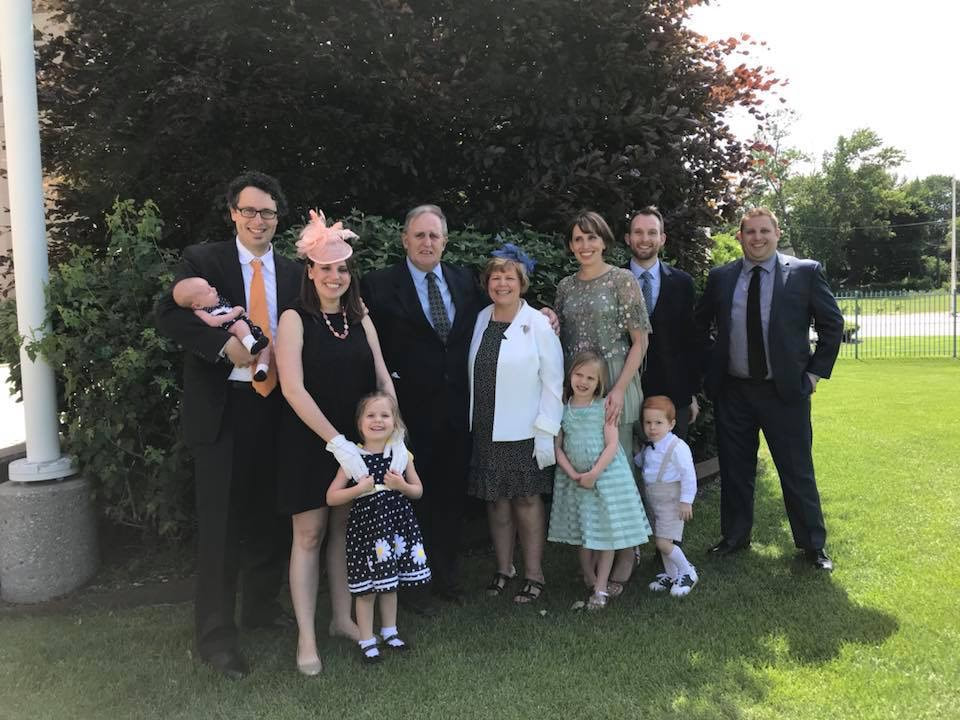


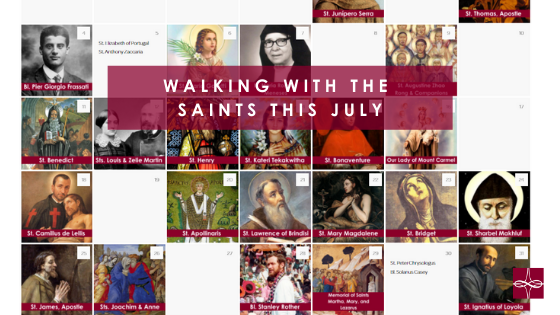



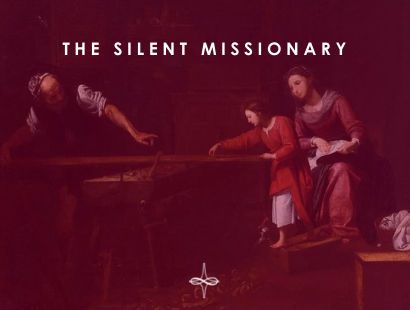

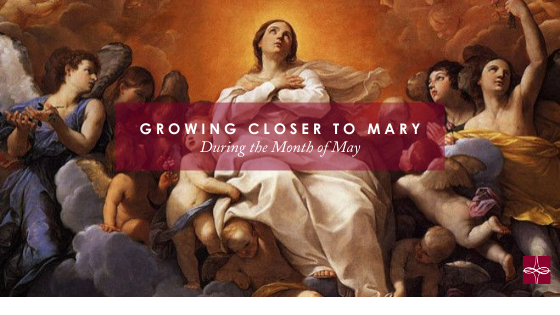


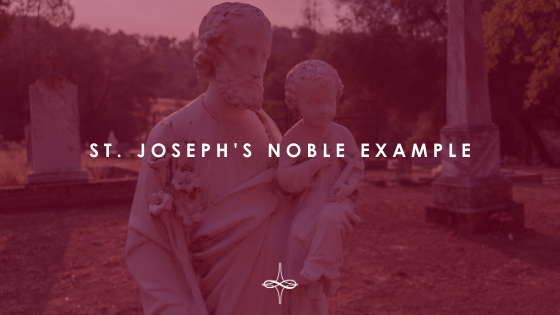





 RSS Feed
RSS Feed